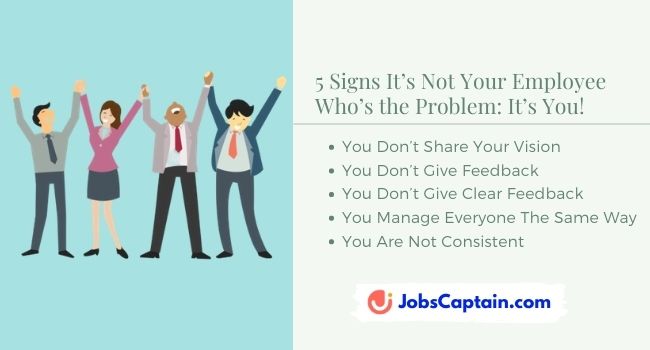
Just unbelievable. Portrait of funny bearded man pointing up with a surprised face expression while standing isolated over white background.
If you have been a manager for a while, then it’s almost certain that you have also managed underperformers; there is no way around it. It is very annoying when someone just pulls the whole team down; it also makes it harder for everyone else to hit their own or the company’s goals. And this also reflects poorly on you as a manager.
Read here more Life Coaching article.
So, what do you do? Are you going to call a meeting, again? Well, have you ever thought that maybe it is somehow your fault that this person is pulling down the whole team? Of course, this is the employee’s fault but, it is also on you – it takes two to tango. It could be that your styles, lack of attention, or communication are contributing to this underperformance.
So, if you want to have more efficient and productive teams, here are a few mistakes that you could be making that pull the whole team down.
First of all, as a manager, you need to give three important pieces of information to your employees: what are your goals as a manager, as a team overall and what are the goals for each employee.
If they don’t know what they are aiming for, how do you expect to properly coordinate the team? Arrange quarterly meetings to discuss and write down all your goals and speak separately with every employee to ensure that everyone knows where they fit into the bigger picture and exactly what is expected of them.
You Don’t Give Feedback
Has this employee ever made you unhappy before? How did you handle that situation? Did you address the problem and found a solution for the next time? If you haven’t talked to them about it, how do you expect them to recognize and fix their mistakes? Giving feedback is always crucial in these kinds of situations.
If you want something to be changed, then you must inform your employee about it within a week (max!), so they will be able to identify it and work towards fixing it for the future.
You Don’t Give Clear Feedback
Continuing from the previous point, just giving your feedback isn’t enough to fix the problem. You need to give them feedback that is not vague – it needs to be clear and actionable.
For example, if you want someone to improve on their emails, don’t just tell them that they need to work on their communication – give them constructive feedback that speaks specifically about that issue.
Something like this could work: “Your update emails are very methodical and great but sometimes; it can be hard to understand what the next steps are. Could you highlight the next steps at the top of your email next week, please?”
You Manage Everyone The Same Way
Many great bosses fall into this trap of managing everyone the same way. However, if your team consists of people with diverse skill sets and personalities, it is crucial that you adapt your style accordingly to better match each employee.
Try to get to know each of your employees personally and find out what working style best works for them. If you learn more about how everyone functions, then you will be able to work well with everyone and have more effective results – not to mention the respect you will gain in the process.
You Are Not Consistent
I know, as a manager you have a lot of things on your plate and it can be very easy to send out mixed messages to your employees. One week you ask them to keep you constantly updated and the next you want them to work more independently.
Again, try to be clear with your feedback and don’t forget to keep notes of your meetings and feedback sessions so you can remain consistent and not confuse your team members. All they are trying to do is work with you to achieve the best results possible – they are not trying to sabotage the team.

Nobody said that it’s easy to manage underperformers, but by working on the above mistakes you may find out that there are several solutions to improve team’s performance.
Thank you for reading article on “5 Signs It’s Not Your Employee Who’s the Problem: It’s You!”
Have you ever been through this situation before? Let us know in the comments section below.



share five signs the problem is you.